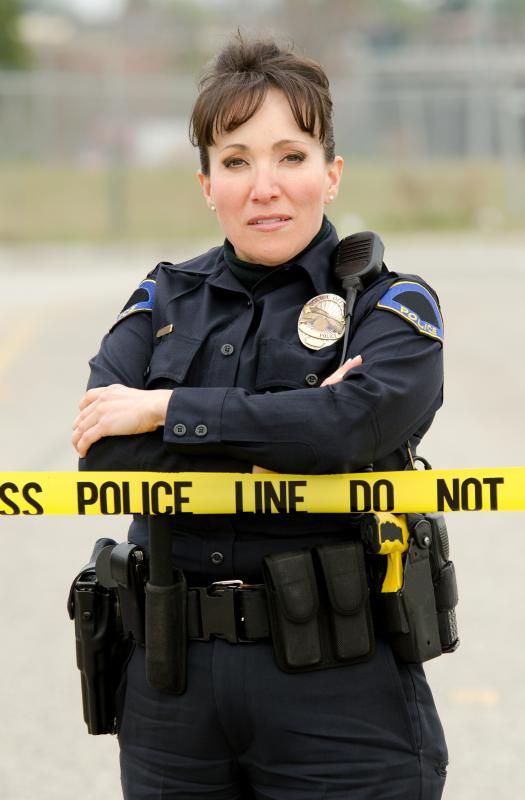At TheHealthBoard, we're committed to delivering accurate, trustworthy information. Our expert-authored content is rigorously fact-checked and sourced from credible authorities. Discover how we uphold the highest standards in providing you with reliable knowledge.
What Are the Signs of PTSD in Law Enforcement Officers?
Post-traumatic stress disorder, or PTSD, is a common mental health disorder experienced by people in many different careers, including those in law enforcement. The symptoms may be mild or they may be severe enough to interfere with a person's life. There are many symptoms of PTSD in law enforcement officers, many of which are forms of avoidance, arousal, or the re-experiencing of stressful events. Law enforcement officers who suspect they have PTSD should seek the assistance of medical professionals so that the condition can be properly identified and treated.
Many symptoms of PTSD in law enforcement officers deal with avoidance. Officers may go out of their way to avoid people, places, or thoughts that bring up memories of the event that triggered the traumatic stress. This avoidance may not be conscious and may appear as taking a dislike to a person or activity that was previously enjoyed. It is also possible for officers to withdraw from close relationships with any or all of the people in their lives. Additionally, officers may genuinely forget the details of what happened, and may even, in extreme cases, completely forget that it happened at all, even when prompted.

The opposite symptom, re-living the event, can also happen with PTSD in law enforcement officers. The most frequent symptom of re-living a stressful event is dreaming about it. Memories of the event may also preoccupy an officer's thoughts, or, in some cases, lead to flashbacks in which the officer begins to relive the experience while fully awake. Flashbacks can be brought on by experiencing similar events or they can come on suddenly and without warning. Non-specific feelings of dread or fear can also be experienced.
A state of intense arousal is another possible symptom of PTSD in law enforcement officers. Officers may be on edge and jumpy or they may be unusually quick to anger due to an excess of adrenaline in the system. Remaining in this over-stimulated state for long can lead to serious health complications, including lack of sleep, high blood pressure, and digestive difficulties.
In many cases it may be difficult for officers to recognize the symptoms of PTSD in themselves. The symptoms are usually first noticed by coworkers or family members and may be denied or dismissed by an officer with PTSD. A diagnosis by a trained medical professional, usually a psychiatrist, is essential.
AS FEATURED ON:
AS FEATURED ON:











Discussion Comments
Hit the nail on the head. I’ve experienced everything except the flashbacks. What’s weird is my PTSD flare-ups occur over things that I experienced that wouldn’t seem otherwise bad. I’ve had to deal with some pretty horrible stuff and most of it doesn’t bother me, at least directly.
A good example is when a 14 y/o girl shot herself in her bedroom. After she was pronounced deceased, the father arrived on scene. What bothered me wasn’t the blood, gore, etc… it was Dad’s reaction. That haunted me for a bit.
I've been contemplating seeing a psych professional for a while. I’m honestly afraid of getting put on psych leave, even though it happens. The rules aren’t clearly outlined. I think taking me away from the job would hurt more than anything.
Counseling for police officers is much more common than it used to be, and it's sometimes mandatory now, when it hasn't always been that way.
I think police officers should probably have to have a psychiatric checkup every few years, just to make sure they're staying on track in their minds. The officers probably wouldn't like it very much, but I know it would be helpful to them in the long run, especially if they work in a big city department where there is a lot more stress, and probably more chances to be shot or killed while on duty.
It might be a good idea to get police officers' families in occasional counseling too, because that job can be rough on everyone.
I have a cousin who was an officer with the city of Birmingham, AL for 30 years. I think he has PTSD. He's very short tempered and acts like the world owes him a living.
He's always thinking the worst about people, and his wife said the reason they live out in the middle of nowhere is because he wanted a place with a low crime rate. Well, they've got it. No one lives around there! He used to keep horses and go horseback riding, and she said that really helped him, but he sold the horses and keeps to himself a lot.
She said he saw a lot of things he doesn't talk about. I guess all police officers see that, though.
Post your comments